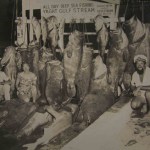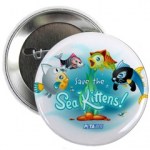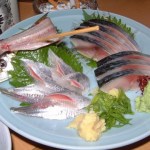
I cannot embed the official video but here's another version:
Here are Beck's lyrics:
I feel uptight when I walk in the city
I feel so cold when I'm at home
Feels like everything's starting to hit me
I lost bed ten minutes ago
Modern guilt I'm staring at nothing
Modern guilt I'm under lock and key
It's not what I have changed,
Turning into convention
Don't know what I've done but I feel ashamed
Standing outside the glass room sidewalk
These people talk about impossible things
And I'm falling down the conversations
Another palm beats into you
Modern guilt is all in our hands
Modern guilt…
As Mark Powell (of the Ocean Conservancy) pointed out in the comments of the last post, Roger Rufe of the Ocean Conservancy said that we need to "use ocean wilderness to lead a new way of thinking about and seeing our oceans through a positive conservation lens, rather than an extractive one." And also that "we must shift our focus from the oceans as fish warehouses and dumpsites and focus on them as natural ocean communities to be cherished and protected."
Agreed.
But this campaign disappeared and, according to Mark Powell, it was because people weren't ready for it. He rightly believes we…
In an extension of first shifting baselines post where Randy Olson and I argued over whether to continue eating seafood, I wrote a guest post last week for The Reef Tank titled What happened to your clients? Um. We ate them. It begins:
"So. What happened to our fish?" asks The Future.
"Um. Well. We ate them," respond the people who were hired to protect the very marine life that directly or indirectly wound up on their dinner table: wild salmon, tuna, coral reefs.
The culprit of the overfishing crisis is small but insatiable: the human stomach. But most people working in marine science…
I know that the year is far from over, but Loren McClenachan, who works with Jeremy Jackson at the Scripps Institution of Oceanography, has what I believe is the shifting baselines story of 2009.
Just to review from the old shifting baselines days, the shifting baselines syndrome implies that there is some sort of change through time (e.g. a population decline) and that that change must have been forgotten, and this leads to collective amnesia of what is natural or pristine. Pauly outlined this idea in his paper in 1995 and then called for the incorporation of unconventional data sources (…
...it was the one trick my mother always had up her sleeve, that way she had of making me feel guilty. She made no bones about it, either. "You can't help it," she told me once. "Slipped it into your baby food. Don't worry, though," she added, smiling like a Cheshire cat. "A healthy dose of guilt never hurt anybody. It's what civilization was built on, guilt. A highly underrated emotion.
President Barack Obama in Dreams from My Father.
Jared Flesher discussed this week A Decline in 'Green Guilt' at the NYTimes Green Inc. Blog. Some groups attribute the decline to the fact that Americans are doing more for the environment (more people are carpooling and planting gardens, especially with the economy in its present state) but Flesher gets to what is likely the true culprit: the environment takes the backseat psychologically in times of economic downturn. According to his post:
A recent Gallup poll, for example, found that, for the first time in 25 years, a majority of Americans think economic growth should be given priority…
Call it religious, call it effective (or ineffective), call it trite. The fact is, there is a lot of guilt-laden language in the conservation movement. Because this will help lay the foundation for future discussions, I wanted to present some examples here.
Guilt-free flying and guilt-free vacations are now possible with the emerging market for eco-lodges and carbon offsets:
Drive a hummer guilt-free with carbon credits:
Guilt-free tropical vacations:
Guilt-free fish:
Guilt-free intimates:
Guilt-free organic vodka:
There are also guilt-free SUVs in many different varieties.
And a…
Back in 2005, I interviewed fisheries biologist Daniel Pauly for a small article on seafood consumer campaigns. This would evolve into the work we do today. I was not able to publish large chunks of the transcripts then, but I am now. I think what Daniel said about average vs. extreme consumers was relevant, particularly in light of the studies on the preference for rare commodities and the recent chow-down on the megamouth shark caught in the Philippines (the 41st megamouth ever found, ever; pictured here).
Here is what Daniel had to say:
The reason why we have giraffes is not because we…
I mentioned in my last post that humans love rare things, but not necessarily albinos. As Justin pointed out in the comments, that is not exactly true. White-skinned albinos are hunted by other humans throughout eastern and central Africa because they believe their body parts will add potency to black magic rituals.
Pink dolphins are also at risk. Last month, an albino Bottlenose dolphin (which is actually deliciously pink) was discovered in an inland lake in Louisiana, which has become such an attraction that conservationists have warned tourists to leave it alone.
Two new experiments from French scientists show that humans love rare things. Not rarities, as in oddities, as in albinos. But rare things as in: not many of them left. That is bad news for many animals and conservation efforts.
Hypothesis: Humans love rare things. Even if they are not really rare.
Experiment 1 (online last year in Nature Precedings):
A team of French scientists and social went into Parisian luxury hotels that were hosting upper class events and asked 316 people if they would prefer eggs (caviar) from a 'rare species' of sturgeon or a 'common species' of sturgeon, or if…
"We are all parasites," a friend recently remarked as our train moved past the graffiti covered walls of Berlin. "Anyone who does not understand this--or thinks that somehow the good that they do in this world outweighs the bad--is delusional."
She is a scientist working for the UK Energy Saving Trust, which markets a low carbon lifestyle to the British public. She entertains very few romantic notions of environmentalism.
"I think if we really looked at the life cycle of human beings we would get some very surprising results," she said. "I am pretty sure we need lazy people kept happy by…
Hopefully you are wondering what the heck is going on.
As I mentioned in my last post (days turned to weeks and it is just moments before a whole month has gone by), I am currently a visiting researcher in the Conservation Science Unit at Cambridge University's Department of Zoology. Here, I am expanding my repertoire, stocking my modest arsenal of ideas, and making decisions about my future. I am soon to submit my dissertation to the University of British Columbia. In that process, Randy Olson and I have decided to close down the Shifting Baselines blog in favor of a new solo endeavor: a…
For the last month, I have been a visiting researcher in the conservation science unit at Cambridge University, which turns 800 (!) this year. Another impressive birthday is today: Charles Darwin's bicentennial--a grand event here in England, although they do admire Darwin daily (note the 10 pound note):
Across the nation, events are commemorating Darwin and his contribution to science, including two of my weekend plans: the British Natural History Museum's Darwin exhibit and tonight's lecture at the Bath Royal Literary & Scientific Institution by Shifting Baselines' own Daniel Pauly (…
It is already February! And I cannot believe I let so many January stories get away from me. So I would like a recap a few of shifting baselines repute now:
1) This article, Deep Sea-crets, ran in the San Diego Union Tribune about a recent expedition to explore deep undersea mounts in the Gulf of California:
What the scientists found was both exhilarating and disheartening. In some of the deeper and more remote locations, such as Las Animas, a seamount midway between the towns of Loreto and La Paz, marine life was both abundant and diverse.
Researchers recorded prosperous fish populations…
I believe in Obama. So I wanted to be part of his story. Our story.
So last Saturday, I flew from London to Washington, D.C. to spend four days celebrating and witnessing the inauguration of our 44th President.
I made my way down to the Sunday concert featuring actors and musicians. The music part was great with opening performances from The Boss and Mary J. Blige. They did what they do best: sing.
But when Steve Carell stood up and gave a short political speech with no intentions of making me laugh I became suspicious. And by the time Tom Hanks opined on Abraham Lincoln's…
A Guilt Trip for Obama
I sent a million emails
Cheering you on in every line.
I watched Will.I.Am's video
About a thousand times.
I stood strong against my parents
(Both McCain supporters).
I recruited my brother:
A first time and Obama voter.
I made inspirational cds,
Sending them to friends in every state.
I bought an Obama-sized cutout
And motored him 'cross the U.S.A.--
He was kicked out in Florida,
Photo-opped in Tennessee,
And adored by all in L.A.
Knowing you were a champ,
I customized a YES WE CAN stamp.
I posted on YouTube,
I read your news every day,
I wrote many rants,
I hoped and…
My friend sent me a link to this t-shirt for sale at Forever 21 (the Wal-Mart of high fashion) and her email read simply: "uh oh". Yes, this is what PETA's Save the Sea Kitten campaign is up against...
Hm. I have mixed feelings about this ultimate example of renaming fish. PETA has a new campaign out to get people to relate to fish as animals rather than as commodities, which is a noble goal and one I very much support. There are a few snags with their Save the Sea Kittens campaign, though.
First of all, fish are not domesticated like kittens (or like chickens! So I also have a hang up about tuna being dubbed "the chicken of the sea"). And I don't think renaming fish as kittens really enhances the mythology around fish (despite all the accessories). Rather, this new campaign might…
The New York Times blogpost The 11 Best Foods You Aren't Eating was one of the most-viewed stories for 2008 and guess what? One of those 11 foods were sardines*! One more reason to Eat Like A Pig!
*Note: I wanted to post a scrummy looking sardine in this post but check out what you get when you Google Image sardines. Not exactly appetizing. Chefs and your photographers: please send delicious-looking photos! [Thank you W.S. for sending this one along:]













